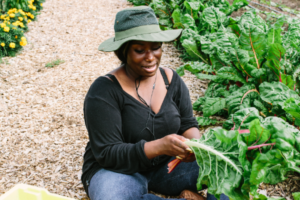This blog post was provided by Paul Taylor, Executive Director of FoodShare Toronto.

Living History
When acknowledging the dark parts of our collective past, we often hear that those who don’t know their history are doomed to repeat it, but what if we acknowledged that history never stopped repeating itself?
When it comes to food, our history is one where Black people were made to toil on land stolen from Indigenous people. The subjugation of Black and Indigenous people is at the very foundation of the modern industrial food system.
This is far from being a thing of the past that only affected ancestors. Racism and colonialism continues to inform the food system that we’re all engaged in today. They affect who has food to eat and who doesn’t, as well as who gets hired to lead the solution strategies to challenge food insecurity— both at the public policy level and in nonprofit organizations and charities across this country.
The Right to Food
FoodShare is a Toronto-based charity dedicated to a vision of our city where everyone can feed themselves, their families, and their community with dignity and joy. And yet, we do our work — inside schools, in kitchens, at urban farms — in a country where nearly 5 million people are food insecure, meaning they don’t have reliable access to the food they need.
This is despite the fact that in 1976, the Canadian government ratified the portion of the Universal Declaration of Human Rights that includes our right to food. That commitment doesn’t mean that the government is responsible for giving out free food. It means our public institutions have a duty to ensure, through sound policy, that people have what they need to be able to feed themselves.
It should mean that food insecurity doesn’t exist in this country.
This is a clear and unequivocal crisis. In a country as wealthy as this one, how can we have more people that are food insecure than the populations of Montreal and Toronto combined?
As with most social struggles, things are even worse for racialized communities, especially those that are Black or Indigenous. Research we did with the PROOF centre at the University of Toronto in 2019 found that Black households were 3.5 times more likely to be food insecure than their white counterparts.
New Solutions For Food Security
To truly tackle a problem like food insecurity we must acknowledge that systems of oppression have more impact on who gets to eat, than how many onions and carrots we grew in our community garden, or how many leftover tins of cranberry sauce we gave to the food bank.
So much of what we face isn’t inevitable, despite the forces that try to convince us otherwise. Canada could end hunger and poverty, fight climate change, wipe out student debt, make transit free and advance decent work legislation with the stroke of a pen.
At FoodShare we believe that realizing our right to food requires admitting that the system isn’t broken — it’s working as it was designed. That’s why we are demanding something new, by acknowledging the ways rampant social inequality is a manifestation of the most painful parts of our past. At FoodShare we’re creating spaces for the folks who have historically been left out of solution-making — Black, Indigenous, people of colour and people with disabilities — to have opportunities to lead food system work in their communities, and demand accountability from those in positions of power.
We’re proud of what we are doing together. And we’re inspired and excited about the type of analysis and work that is bubbling up in organizations, workplaces and campuses from coast to coast. Hard, honest work, that acknowledges where we’ve come from and just how far we have yet to go. We’re reimagining what our communities and ultimately our country should look like; we are confident that better is possible.
To celebrate CanadaHelps’ 20th anniversary, FoodShare Toronto took part in a video series to highlight how charities touch all of our lives, every day. Watch how FoodShare Toronto is making a big impact in our film below. And watch the rest of the video series on our website.
Leave a Reply